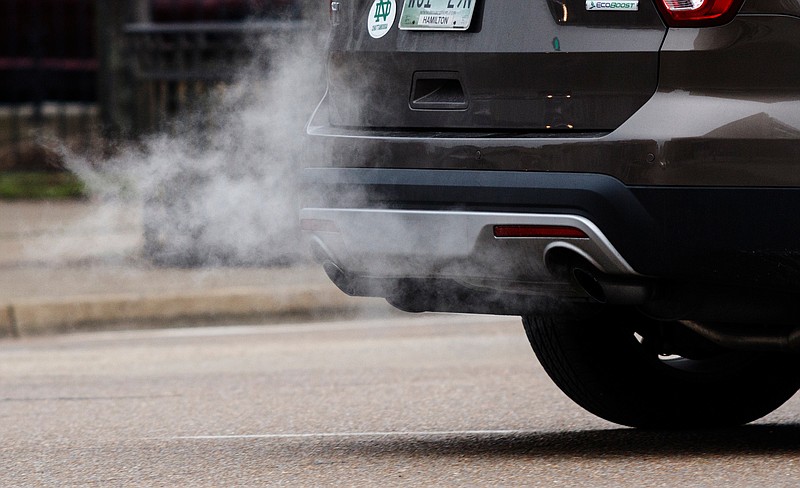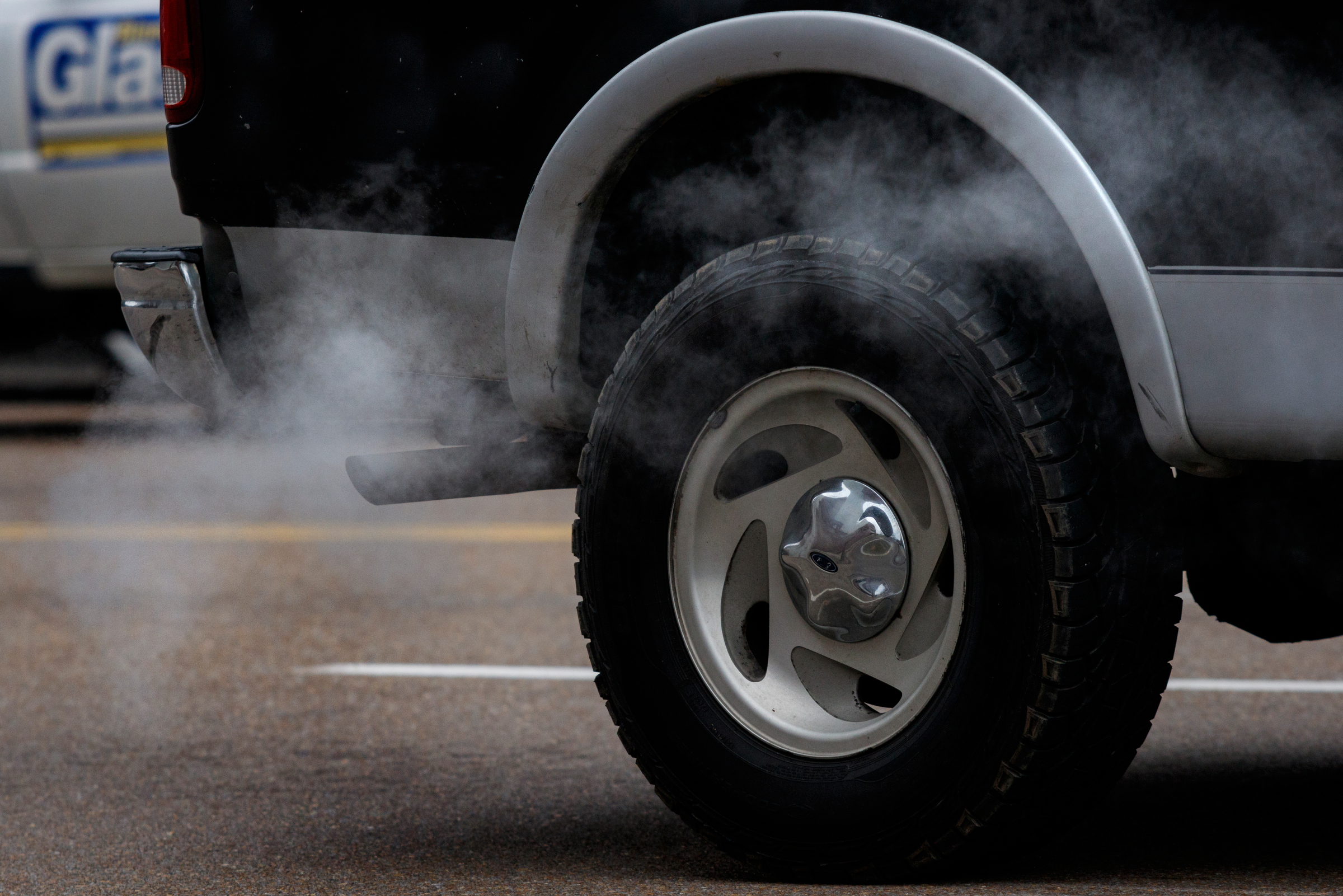NASHVILLE - Two local legislators want to end vehicle emissions testing in Hamilton County and five other Tennessee counties, arguing it's no longer needed because the entire state now complies with federal air quality health standards.
Sen. Bo Watson, R-Hixson, and Rep. Mike Carter, R-Ooltewah, have introduced legislation to do just that.
"If you think about it, who is hurt most by having to pay for emissions. It's those who can least afford it," Watson said. "So in many ways I would argue we're removing a burden from some citizens who have less capability to pay to get their car fixed."
Over the past two years, the Tennessee Department of Environment and Conservation has announced the federal Environmental Protection Agency has designated Tennessee as having "attained" compliance when it comes to standards for particle pollution, as well as smog standards.
But state and local officials, as well as environmental groups, say it's not that simple for Hamilton, Davidson, Rutherford, Sumner, Williamson and Wilson counties. All have what are known as inspection and maintenance programs under a State Implementation Plan (SIP) approved by EPA and which is federally enforceable.
"To eliminate these programs requires a SIP demonstration or revision to be developed, submitted to EPA and approved," TDEC spokeswoman Kim Schofinski said in a statement to the Times Free Press on Tuesday.
"We are aware of the bill proposed by Sen. Watson and Rep. Carter and are developing our analysis through the traditional process with the Legislature," Schofinksi said.
Her comments came several hours after two TDEC officials spoke with Carter in his legislative office.
Anne Passino, staff attorney for the Southern Environmental Law Center, meanwhile, said "counties and cities across Tennessee protect their citizens' health when they require vehicle emission inspections. That's because the transportation sector is one of the largest contributors to harmful air pollution."
Carter said he recognizes that but said EPA provides counties a number of options to achieve or, in this case, maintain compliance.
"What you have to understand is EPA doesn't say you have to have emissions controls," Carter said. "Knoxville doesn't have them. So what [federal officials] say is we're going to lay you out a salad bar, and you can fix your own salad and you can put on what you like - or don't like.
"And I'm saying take off the anchovies and put on olives," the lawmaker added.
Hamilton County Mayor Jim Coppinger said the local plan was created back in 2005, before he became mayor.
"I hear from people throughout the county who want the emissions testing to go away, and if it's possible and legal to do so, I would support that. If there's no need to be doing emissions testing, then we shouldn't be doing it."
Coppinger and Bob Colby, director of the Chattanooga-Hamilton County Air Pollution Control Bureau, said the county implemented the program in 2005 with then-Hamilton County Mayor Claude Ramsey and then-Chattanooga mayor, now-U.S. Sen. Bob Corker after laying the groundwork as they sought an auto manufacturer to locate in the old Volunteer Army Ammunition Plant.
That culminated with the community landing Volkswagen as a tenant, generating thousands of direct and spinoff jobs in what today is known as Enterprise South.
Because of the vehicle emissions testing program, Colby said, EPA gave Hamilton County credits for both nitrogen dioxide reductions and to a lesser extent on volatile organic compounds. Nitrogen dioxide comes from road traffic and other fossil fuels, which contribute among other things to ozone and particulate matter.
"In order to get rid of the emissions testing program we have to come up with emissions credits equal to those credits that EPA gave us in that step back in 2005 for the emissions," Colby said.
Other steps taken by the county included seasonable burning bans and a vapor recovery program at service stations.
Asked about steps by industry, Colby said manufacturing "already paid its price throughout the years, pretty much," a reference to new pollution controls installed at some plants in the 1970s, 1980s and beyond. A number of other factories went out of business or moved operations overseas.
Colby said "we just don't have in our inventory emission quantities of NOX to get reductions to make up for the loss of the emission testing program for Hamilton County."
And vehicles, Colby said, "are the ones that are causing 75 percent of our problem."
He added that "probably the only [thing] we would do that [gets further reductions] would be for Signal Mountain [Cement] to either shut down or greatly reduce their production for controlling their emissions significantly."
Chattanooga Mayor Andy Berke had no comment on the legislation.
Carter and Watson said they believe the Tennessee Valley Authority's shutdown of a number of the federally owned utilities' coal-fired power plants, as well as lower emission rates of newer vehicles, are playing roles in reducing pollution.
Moreover, VW and Amazon, Carter said, both have LEED certification in which buildings earn points across several categories, including energy use and air quality.
And Carter also said state plans to construct a redesigned intersection of interstates 75 and 24 in Brainerd and East Ridge will help alleviate congestion in the nation's 11th most packed interstate nationwide.
Rep. Jason Powell, D-Nashville, said a vehicle emissions testing program is a "critically important tool for cities and communities around the state. It's important to make sure that we have good, clean, flowing air. It's important for development, to make sure that our air quality is good and construction so that we continue to grow."
Changing that is "tremendously disturbing, and hopefully the legislation is going nowhere," Powell said.
Carter said a Soddy-Daisy businesswoman first approached him about the emissions inspection program, which costs $9 per vehicle. She told him she and her husband purchased several used vehicles that couldn't pass the inspection and didn't have the large sums of money it would take to fix them. Others are affected as well, he said.
Noting that he has asthma, Carter said, "I understand air quality, because I'm uniquely affected by it. I'm just saying let's find a better way. I don't want to lose 100 percent attainment; I just want to do what Knoxville did and pick a better way that doesn't put it on the back of the working, struggling men and women."
Staff writer Mark Pace contributed to this story.
Contact Andy Sher at asher@timesfreepress.com or 615-255-0550. Follow him on Twitter @AndySher1.

